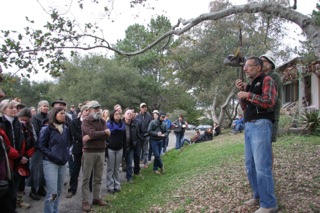 Part information exchange and part pep rally, the 33rd Eco Farm Conference at Asilomar in Pacific Grove brought together farmers and agricultural reformers from all over the country for their annual meeting of the minds.
Part information exchange and part pep rally, the 33rd Eco Farm Conference at Asilomar in Pacific Grove brought together farmers and agricultural reformers from all over the country for their annual meeting of the minds.
The editor and co-publisher of our sister magazines in New York—Edible East End, Edible Brooklyn and Edible Manhattan—Brian Halweil opened the conference with a rousing call to action that got everyone up in a standing ovation.
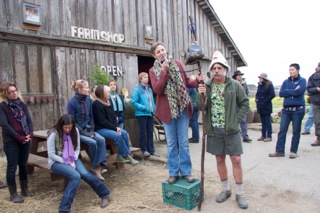
While the overall mood was festive, USDA National Organic Policy Advisor Mark Lipson delivered bad news from Washington. He reported that the 2008 Farm Bill extension authorized by Congress as part of the 11th hour fiscal cliff deal failed to renew funding for organic research and organic certification cost sharing.
“It’s discouraging for the organic community,” said Lipson. “These programs did great work over the last few years and we are hoping that Congress will still act.”
The 2008 Farm Bill has funneled more than $100 mil into organic research and $21 mil into certification cost sharing. It also directed $60 mil towards conservation programs and those programs were spared in the extension.
Lipson said the National Organics Program celebrated its 10th anniversary in 2012, a year in which sales of organic products reached $31 bil. He added that the US Secretary of Agriculture, Tom Vilsack, believes in organic farming as a means of rural development and job creation.
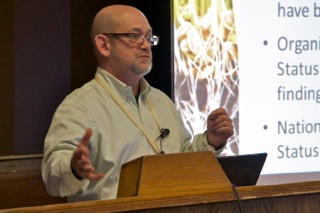 The organic community’s recommendation for Ag Secretary for years ago, Jim Riddle, was one of the inspirational keynote speakers at the conference. Riddle—an organic farmer himself—has chaired the National Organic Standards Board and works as Organic Outreach Coordinator at the University of Minnesota.
The organic community’s recommendation for Ag Secretary for years ago, Jim Riddle, was one of the inspirational keynote speakers at the conference. Riddle—an organic farmer himself—has chaired the National Organic Standards Board and works as Organic Outreach Coordinator at the University of Minnesota.
Taking on the big theme of the conference Feed the World You Want to Live In, Riddle said, “Our challenge is to live our lives in concert with our values.” He encouraged the audience to grow food themselves and spend their food dollars wisely on CSAs or at Farmer’s Markets, but he added, “What comes out of our mouths is just as important as what goes in.” And he went on to outline ten actions that will help advance the cause of sustainable living.
1. Educate family and friends about your food choices. They are the most trusted sources of information.
2. Stand tall. Farmers should tell their own ecological stories.
3. Teach workshops. Share your knowledge with field days and tours.
4. Take direct action. Continue to push for labeling of GMO foods, for example. Anti-GMO movements are now underway in 30 states.
5. Vote. Hold the incumbents and their challengers accountable.
6. Run for office. The world is run by those who show up and those who can sit through meetings.
7. Use your electronic devices for good. Check out the eOrganic web info site and the organic channel on You Tube.
8. Get involved in research. Research drives policy and is another way to shift the balance.
9. Build Community. Volunteer for a local garden or join a home brewing club.
10. Get involved. We asked to be regulated so that organic would have real meaning and are so glad that Mark Lipson is in bed with the USDA helping protect organic.
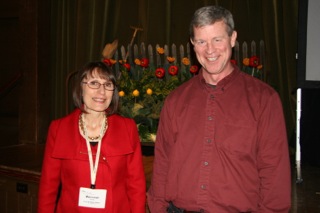 Eco Farm included more than 60 workshops on topics from beekeeping and butchery to the hard cider renaissance underway in Sonoma County. A crowd packed the session on biodynamic farming led by Dennis Klocek of the Rudolf Steiner College. Some participants felt certified biodynamically grown food is the next step for the “good food” movement.
Eco Farm included more than 60 workshops on topics from beekeeping and butchery to the hard cider renaissance underway in Sonoma County. A crowd packed the session on biodynamic farming led by Dennis Klocek of the Rudolf Steiner College. Some participants felt certified biodynamically grown food is the next step for the “good food” movement.
“Consolidation is going on in the organics industry,” warned speaker Winonah Hauter, director of Food and Water Watch and author of a new book called Foodopoly. “Fourteen large agri-businesses have bought up formerly independent organic brands and they are lobbying to relax organic standards.”
Eco Farm Executive Director Ken Dickerson said he was very pleased that the association’s scholarship fund had quadrupled over the past two years, meaning that more young and Hispanic farmers were among the 1,700 participants.
“Young farmers need access to the information here and I’m wowed by the generosity shown by members of our association, it shows that inclusion is a value of our community,” he said.
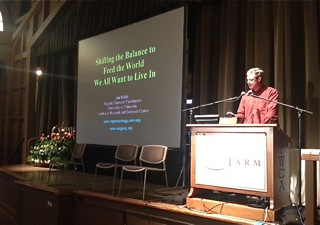 Sharing information is at the heart of Eco Farm, presenters, exhibitors, participants and even journalists all engage in the back and forth with little evidence of rivalry.
Sharing information is at the heart of Eco Farm, presenters, exhibitors, participants and even journalists all engage in the back and forth with little evidence of rivalry.
“It’s because our work is mission-driven,” says Dickerson. “It’s meant to accomplish more than just providing economic support. It’s meant to care for the earth and care for its people.”
About the author
Deborah Luhrman is publisher and editor of Edible Monterey Bay. A lifelong journalist, she has reported from around the globe, but now prefers covering our flourishing local food scene and growing her own vegetables in the Santa Cruz Mountains.
- Deborah Luhrmanhttps://www.ediblemontereybay.com/author/dluhrman/
- Deborah Luhrmanhttps://www.ediblemontereybay.com/author/dluhrman/
- Deborah Luhrmanhttps://www.ediblemontereybay.com/author/dluhrman/
- Deborah Luhrmanhttps://www.ediblemontereybay.com/author/dluhrman/


